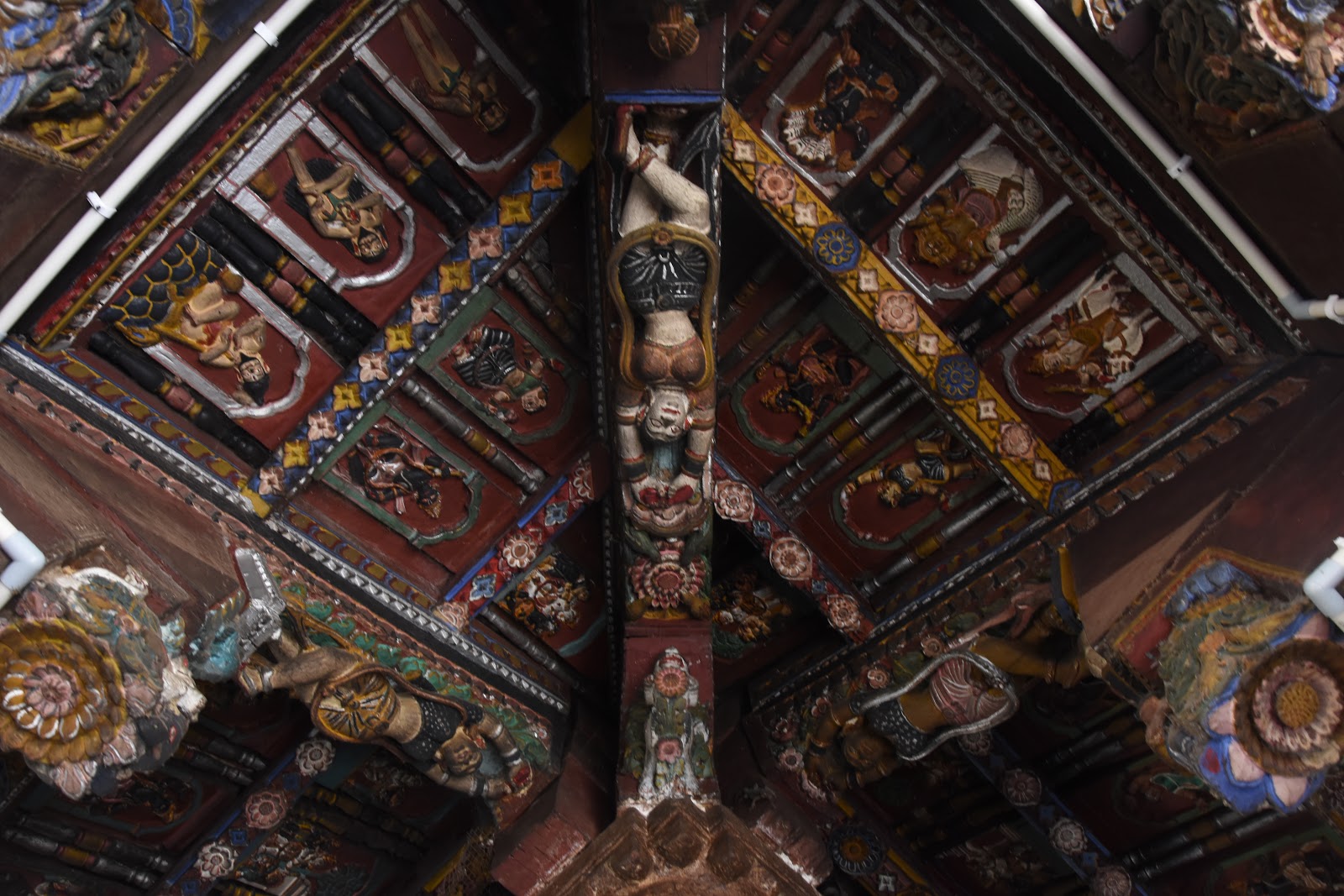Biranchi Narayan Temple: Wooden Konark Temple
 |
| Intricate wood carvings on the Ceiling |
The Sun
Temple in Konark is a marvel etched in stone. Although its architectural style
and scale is difficult to be replicated, it does, in fact, have a replica of
sorts, though in wood! Known as the ‘Wooden Konark’, Biranchi Narayan Temple,
in Buguda in Ganjam district is the second Sun Temple in Odisha that was built
in 1790 by King Srikar Bhanja of Bhanja Dynasty. Dedicated to the worship of
the Sun God, it is also second called as ‘Arkhakhetra’.
Sadly this beautiful temple is deteriorating day by day due to lack of attention by the authorities of archelogical departments. The walls of the temple contains beautiful murals but they are vanishing. The inside and outside Mandapa contains beautiful wood works which were originally painted in water colours. But recently the temple authorities have started painting some of the works with regular paints which has ruined its beauty. If something is not done immediately soon the murals and wood works would become a history.
While interacting, Bhaktaram Das, parichalak of the temple for the last 15 years, shared, "Though
the temple was built in 1790, there was no deity installed inside. The idol of
Lord Biranchi Narayan was brought in much later. The idol was recovered
from the ruins of Malatigarh." It is interesting to note that while the temple
belongs to Bhanja Dynasty, the idol belongs to the Somvanshi Dynasty.
Just
like the Sun Temple in Konark, the Biranchi Narayan Temple is also built in the
form of a chariot driven by seven horses. However, the latter has only one wheel
on its left compared to the former, which has 24 wheels. That is not the only
difference though. "The Konark Sun temple faces the east whereas Biranchi
Narayan Sun Temple faces west. Similarly, rays of the rising sun fall on the
installed Surya at Konark Temple while the rays of the setting sun fall on
Surya's feet at Biranchi Narayan Temple," Das said pointing out the other
differences.
 |
| Half Wheel |
The
architecture and carvings on its walls being the major attraction, the roof of
the temple is constructed on 46 pillars and contains intricate wood designs,
which narrate the story of Mahabharata. The walls of the temples have paintings
that describe the entire Ramayana. The paintings/carvings on the ceiling of the
entrance mandapa tell all the stories from birth of Lord Krishna to His Uncle Kansa’s
death. The ceiling of the inner mandapa narrates the story of Lord Ram’s birth
to Ravana’s death.
 |
| Story of Ramayana on the walls |
Lamenting
at the deteriorating condition of the temple, Das said, "There are no
authorities who could take the responsibility for the renovation and maintenance
of the temple. The wood carvings are waning and to protect them, we painted them
with normal paints in 1960 but it needs maintenance. Similarly, most of the
wall paintings have eroded and we don't know any technique to restore
them."
There
is also a map of Puri town in the 17th century but most of it is worn out and
needs immediate conservation.
 |
| Map of Puri Town |
“The
wood carvings were originally painted with water colours but now with regular
paint, it's beauty has been completely destroyed. The temple is under the state
archaeology department but they haven’t taken a single step towards its
preservation and protection," added Das.
In foreign countries, the archeologist are technically really advanced and they have proper knowledge to conserve and preserve such beautiful art works. I hope somebody would understand its importance and would come up with better ideas to protect the art works, he added.
There is a general belief among devotees that those suffering from eczema are cured if they worship the Sun God here and donate things whose name start with the 'B' sounding syllable.
The
temple also has a wide collection of 400 books of which around 200 are ‘Tala
Patra Pothis (engraved palm leaves documents)’ on Odia vyakarna (grammar), Puranas
and texts on Ayurveda medicines among others.
 |
| Pothis and palm leaf Manuscripts |
Maghasaptami,
Samba Dashami, Rath Yatra, Danda Yatra (in April), Durga Puja and Kali Puja are
the major festivals celebrated here.
Published in MyCityLinks
PC: Rakesh K Roul
PC: Rakesh K Roul






2 comments
Write commentsHi Monalisha, thanks for the detailed information about the temple. This temple murals were painted by Mughal and Odia painters at the time of its formation and the wooden structure of the temple is one of the rarest influence / example of Maratha architecture in Odisha.
ReplyHi Meenaketan Sir, Wow I had no idea about Mughal and Maratha connection. I Would like to know more about it, so that I could add all those information in the write up..
Reply